Reflective Learning Style: Strengths, Weaknesses, and Future Plans
VerifiedAdded on 2019/09/16
|7
|2384
|242
Report
AI Summary
The writer reflects on their journey from a Sudanese student to an undergraduate student in the UK. They share their experiences of studying, working as a volunteer, and later pursuing a Master's degree in Public Health at Liverpool John Moore's University. The writer expresses frustration with the academic system, especially with regards to assignments and time management. However, they found support from tutors and family members, which motivated them to continue learning. They discovered their own learning style and plan to succeed by working hard, attending support sessions, being organized, and focusing on time management.
Contribute Materials
Your contribution can guide someone’s learning journey. Share your
documents today.
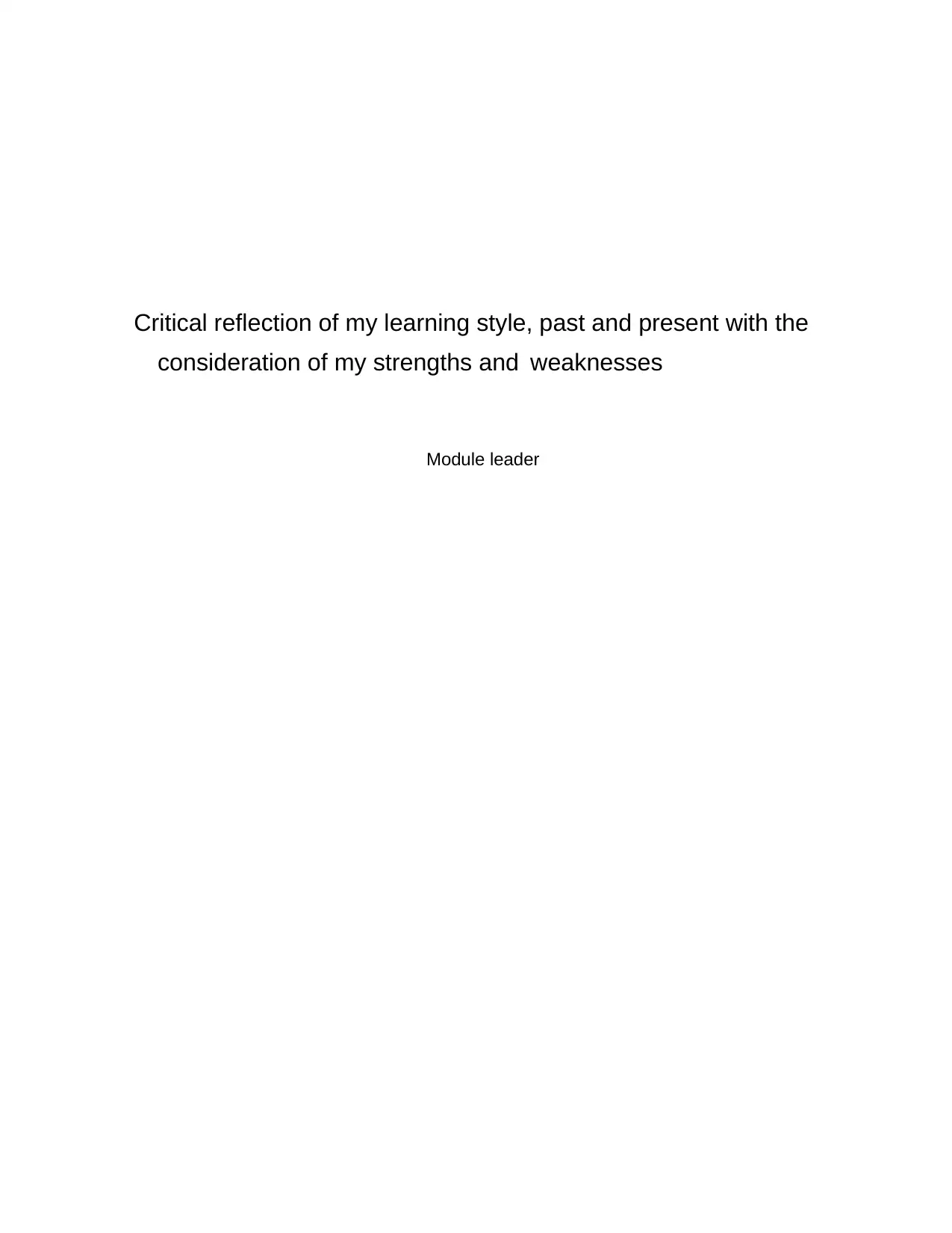
Critical reflection of my learning style, past and present with the
consideration of my strengths and weaknesses
Module leader
consideration of my strengths and weaknesses
Module leader
Secure Best Marks with AI Grader
Need help grading? Try our AI Grader for instant feedback on your assignments.
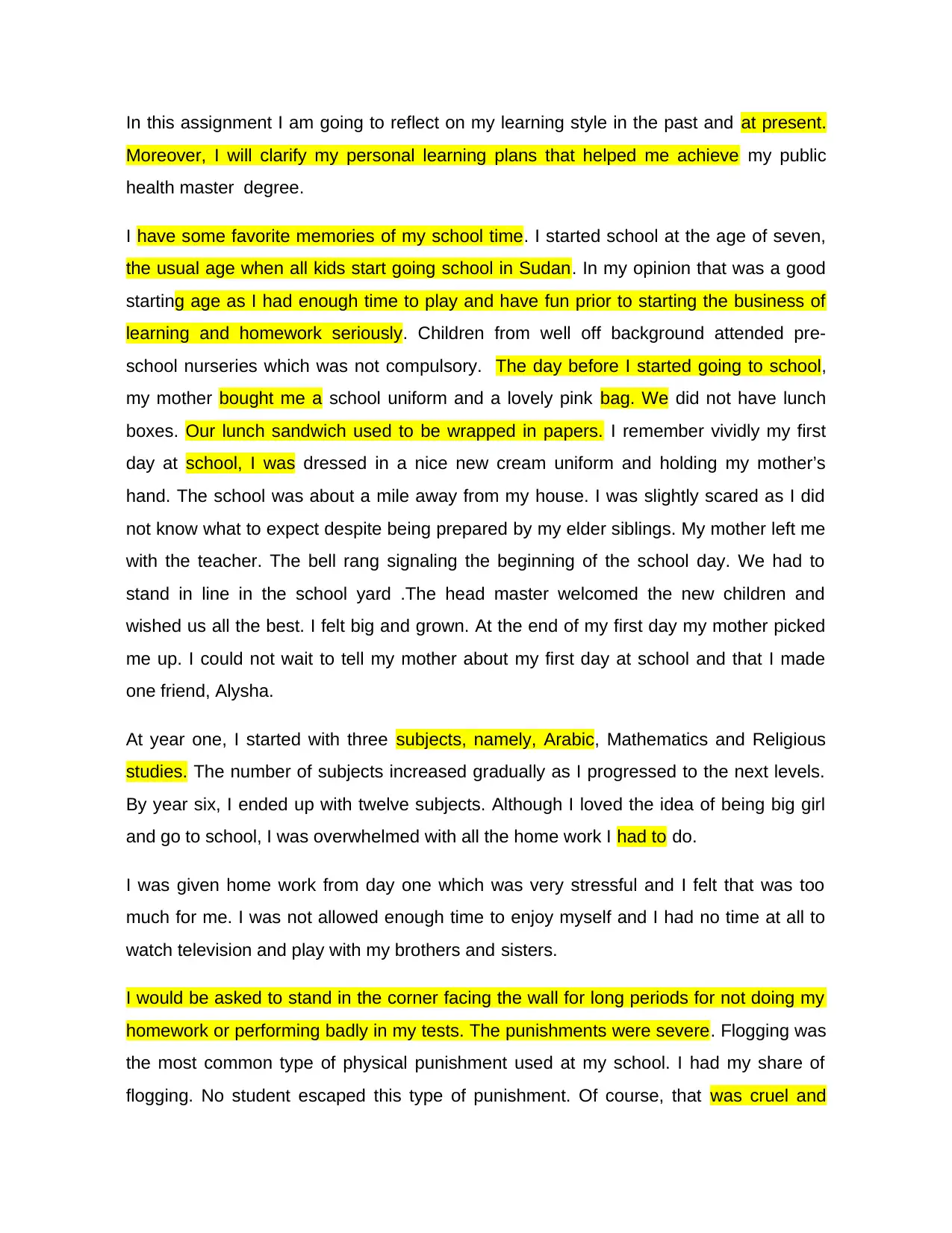
In this assignment I am going to reflect on my learning style in the past and at present.
Moreover, I will clarify my personal learning plans that helped me achieve my public
health master degree.
I have some favorite memories of my school time. I started school at the age of seven,
the usual age when all kids start going school in Sudan. In my opinion that was a good
starting age as I had enough time to play and have fun prior to starting the business of
learning and homework seriously. Children from well off background attended pre-
school nurseries which was not compulsory. The day before I started going to school,
my mother bought me a school uniform and a lovely pink bag. We did not have lunch
boxes. Our lunch sandwich used to be wrapped in papers. I remember vividly my first
day at school, I was dressed in a nice new cream uniform and holding my mother’s
hand. The school was about a mile away from my house. I was slightly scared as I did
not know what to expect despite being prepared by my elder siblings. My mother left me
with the teacher. The bell rang signaling the beginning of the school day. We had to
stand in line in the school yard .The head master welcomed the new children and
wished us all the best. I felt big and grown. At the end of my first day my mother picked
me up. I could not wait to tell my mother about my first day at school and that I made
one friend, Alysha.
At year one, I started with three subjects, namely, Arabic, Mathematics and Religious
studies. The number of subjects increased gradually as I progressed to the next levels.
By year six, I ended up with twelve subjects. Although I loved the idea of being big girl
and go to school, I was overwhelmed with all the home work I had to do.
I was given home work from day one which was very stressful and I felt that was too
much for me. I was not allowed enough time to enjoy myself and I had no time at all to
watch television and play with my brothers and sisters.
I would be asked to stand in the corner facing the wall for long periods for not doing my
homework or performing badly in my tests. The punishments were severe. Flogging was
the most common type of physical punishment used at my school. I had my share of
flogging. No student escaped this type of punishment. Of course, that was cruel and
Moreover, I will clarify my personal learning plans that helped me achieve my public
health master degree.
I have some favorite memories of my school time. I started school at the age of seven,
the usual age when all kids start going school in Sudan. In my opinion that was a good
starting age as I had enough time to play and have fun prior to starting the business of
learning and homework seriously. Children from well off background attended pre-
school nurseries which was not compulsory. The day before I started going to school,
my mother bought me a school uniform and a lovely pink bag. We did not have lunch
boxes. Our lunch sandwich used to be wrapped in papers. I remember vividly my first
day at school, I was dressed in a nice new cream uniform and holding my mother’s
hand. The school was about a mile away from my house. I was slightly scared as I did
not know what to expect despite being prepared by my elder siblings. My mother left me
with the teacher. The bell rang signaling the beginning of the school day. We had to
stand in line in the school yard .The head master welcomed the new children and
wished us all the best. I felt big and grown. At the end of my first day my mother picked
me up. I could not wait to tell my mother about my first day at school and that I made
one friend, Alysha.
At year one, I started with three subjects, namely, Arabic, Mathematics and Religious
studies. The number of subjects increased gradually as I progressed to the next levels.
By year six, I ended up with twelve subjects. Although I loved the idea of being big girl
and go to school, I was overwhelmed with all the home work I had to do.
I was given home work from day one which was very stressful and I felt that was too
much for me. I was not allowed enough time to enjoy myself and I had no time at all to
watch television and play with my brothers and sisters.
I would be asked to stand in the corner facing the wall for long periods for not doing my
homework or performing badly in my tests. The punishments were severe. Flogging was
the most common type of physical punishment used at my school. I had my share of
flogging. No student escaped this type of punishment. Of course, that was cruel and
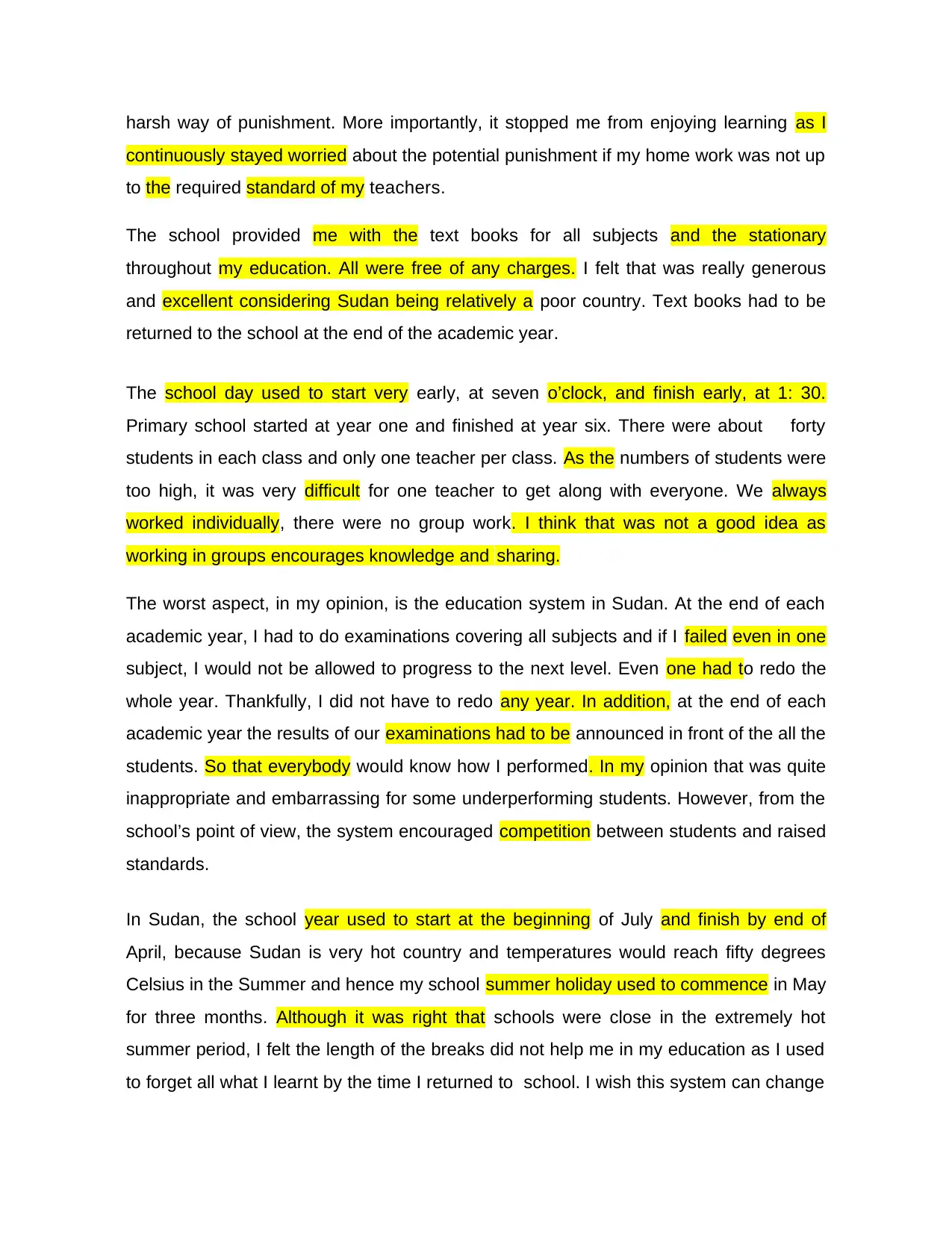
harsh way of punishment. More importantly, it stopped me from enjoying learning as I
continuously stayed worried about the potential punishment if my home work was not up
to the required standard of my teachers.
The school provided me with the text books for all subjects and the stationary
throughout my education. All were free of any charges. I felt that was really generous
and excellent considering Sudan being relatively a poor country. Text books had to be
returned to the school at the end of the academic year.
The school day used to start very early, at seven o’clock, and finish early, at 1: 30.
Primary school started at year one and finished at year six. There were about forty
students in each class and only one teacher per class. As the numbers of students were
too high, it was very difficult for one teacher to get along with everyone. We always
worked individually, there were no group work. I think that was not a good idea as
working in groups encourages knowledge and sharing.
The worst aspect, in my opinion, is the education system in Sudan. At the end of each
academic year, I had to do examinations covering all subjects and if I failed even in one
subject, I would not be allowed to progress to the next level. Even one had to redo the
whole year. Thankfully, I did not have to redo any year. In addition, at the end of each
academic year the results of our examinations had to be announced in front of the all the
students. So that everybody would know how I performed. In my opinion that was quite
inappropriate and embarrassing for some underperforming students. However, from the
school’s point of view, the system encouraged competition between students and raised
standards.
In Sudan, the school year used to start at the beginning of July and finish by end of
April, because Sudan is very hot country and temperatures would reach fifty degrees
Celsius in the Summer and hence my school summer holiday used to commence in May
for three months. Although it was right that schools were close in the extremely hot
summer period, I felt the length of the breaks did not help me in my education as I used
to forget all what I learnt by the time I returned to school. I wish this system can change
continuously stayed worried about the potential punishment if my home work was not up
to the required standard of my teachers.
The school provided me with the text books for all subjects and the stationary
throughout my education. All were free of any charges. I felt that was really generous
and excellent considering Sudan being relatively a poor country. Text books had to be
returned to the school at the end of the academic year.
The school day used to start very early, at seven o’clock, and finish early, at 1: 30.
Primary school started at year one and finished at year six. There were about forty
students in each class and only one teacher per class. As the numbers of students were
too high, it was very difficult for one teacher to get along with everyone. We always
worked individually, there were no group work. I think that was not a good idea as
working in groups encourages knowledge and sharing.
The worst aspect, in my opinion, is the education system in Sudan. At the end of each
academic year, I had to do examinations covering all subjects and if I failed even in one
subject, I would not be allowed to progress to the next level. Even one had to redo the
whole year. Thankfully, I did not have to redo any year. In addition, at the end of each
academic year the results of our examinations had to be announced in front of the all the
students. So that everybody would know how I performed. In my opinion that was quite
inappropriate and embarrassing for some underperforming students. However, from the
school’s point of view, the system encouraged competition between students and raised
standards.
In Sudan, the school year used to start at the beginning of July and finish by end of
April, because Sudan is very hot country and temperatures would reach fifty degrees
Celsius in the Summer and hence my school summer holiday used to commence in May
for three months. Although it was right that schools were close in the extremely hot
summer period, I felt the length of the breaks did not help me in my education as I used
to forget all what I learnt by the time I returned to school. I wish this system can change
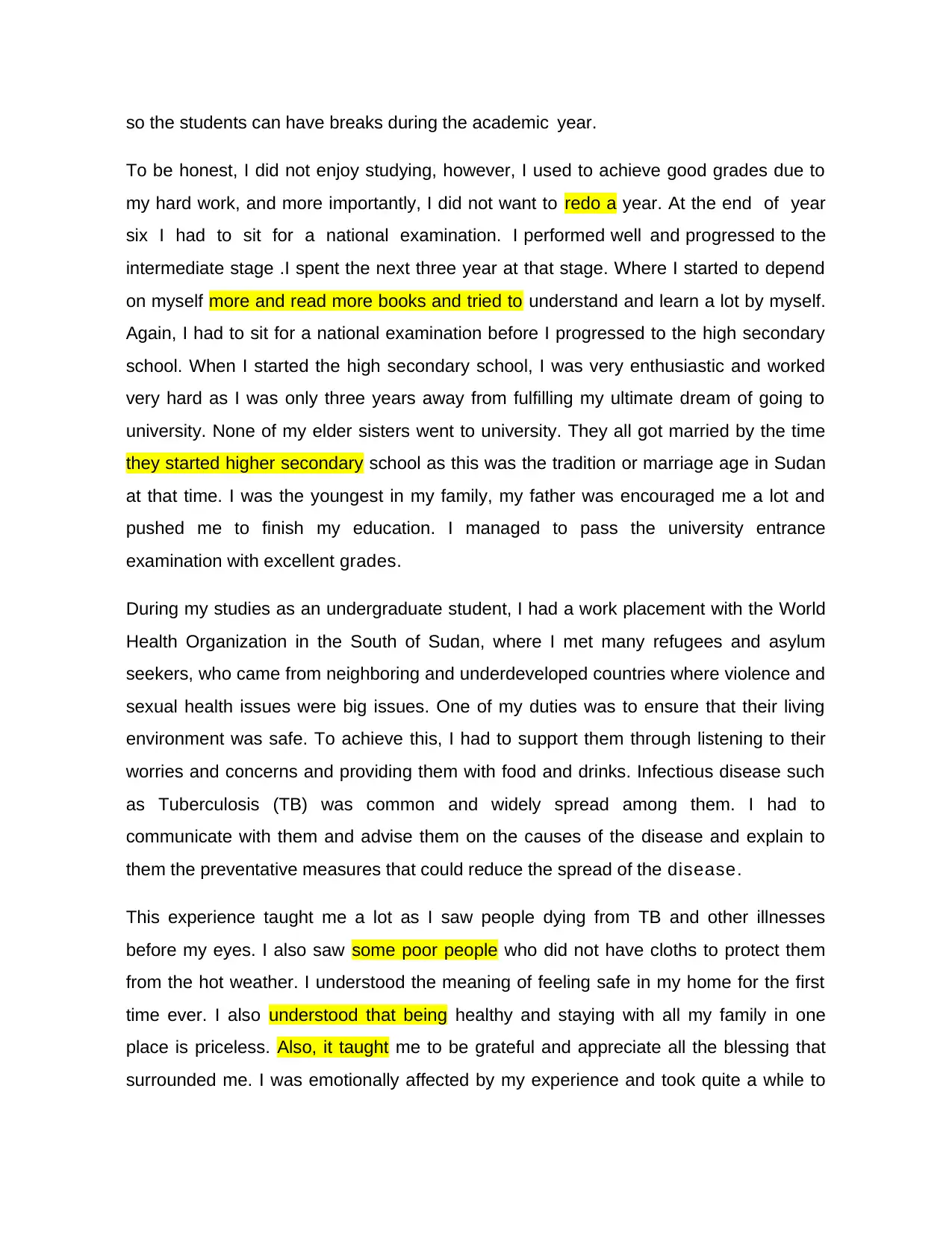
so the students can have breaks during the academic year.
To be honest, I did not enjoy studying, however, I used to achieve good grades due to
my hard work, and more importantly, I did not want to redo a year. At the end of year
six I had to sit for a national examination. I performed well and progressed to the
intermediate stage .I spent the next three year at that stage. Where I started to depend
on myself more and read more books and tried to understand and learn a lot by myself.
Again, I had to sit for a national examination before I progressed to the high secondary
school. When I started the high secondary school, I was very enthusiastic and worked
very hard as I was only three years away from fulfilling my ultimate dream of going to
university. None of my elder sisters went to university. They all got married by the time
they started higher secondary school as this was the tradition or marriage age in Sudan
at that time. I was the youngest in my family, my father was encouraged me a lot and
pushed me to finish my education. I managed to pass the university entrance
examination with excellent grades.
During my studies as an undergraduate student, I had a work placement with the World
Health Organization in the South of Sudan, where I met many refugees and asylum
seekers, who came from neighboring and underdeveloped countries where violence and
sexual health issues were big issues. One of my duties was to ensure that their living
environment was safe. To achieve this, I had to support them through listening to their
worries and concerns and providing them with food and drinks. Infectious disease such
as Tuberculosis (TB) was common and widely spread among them. I had to
communicate with them and advise them on the causes of the disease and explain to
them the preventative measures that could reduce the spread of the disease.
This experience taught me a lot as I saw people dying from TB and other illnesses
before my eyes. I also saw some poor people who did not have cloths to protect them
from the hot weather. I understood the meaning of feeling safe in my home for the first
time ever. I also understood that being healthy and staying with all my family in one
place is priceless. Also, it taught me to be grateful and appreciate all the blessing that
surrounded me. I was emotionally affected by my experience and took quite a while to
To be honest, I did not enjoy studying, however, I used to achieve good grades due to
my hard work, and more importantly, I did not want to redo a year. At the end of year
six I had to sit for a national examination. I performed well and progressed to the
intermediate stage .I spent the next three year at that stage. Where I started to depend
on myself more and read more books and tried to understand and learn a lot by myself.
Again, I had to sit for a national examination before I progressed to the high secondary
school. When I started the high secondary school, I was very enthusiastic and worked
very hard as I was only three years away from fulfilling my ultimate dream of going to
university. None of my elder sisters went to university. They all got married by the time
they started higher secondary school as this was the tradition or marriage age in Sudan
at that time. I was the youngest in my family, my father was encouraged me a lot and
pushed me to finish my education. I managed to pass the university entrance
examination with excellent grades.
During my studies as an undergraduate student, I had a work placement with the World
Health Organization in the South of Sudan, where I met many refugees and asylum
seekers, who came from neighboring and underdeveloped countries where violence and
sexual health issues were big issues. One of my duties was to ensure that their living
environment was safe. To achieve this, I had to support them through listening to their
worries and concerns and providing them with food and drinks. Infectious disease such
as Tuberculosis (TB) was common and widely spread among them. I had to
communicate with them and advise them on the causes of the disease and explain to
them the preventative measures that could reduce the spread of the disease.
This experience taught me a lot as I saw people dying from TB and other illnesses
before my eyes. I also saw some poor people who did not have cloths to protect them
from the hot weather. I understood the meaning of feeling safe in my home for the first
time ever. I also understood that being healthy and staying with all my family in one
place is priceless. Also, it taught me to be grateful and appreciate all the blessing that
surrounded me. I was emotionally affected by my experience and took quite a while to
Secure Best Marks with AI Grader
Need help grading? Try our AI Grader for instant feedback on your assignments.
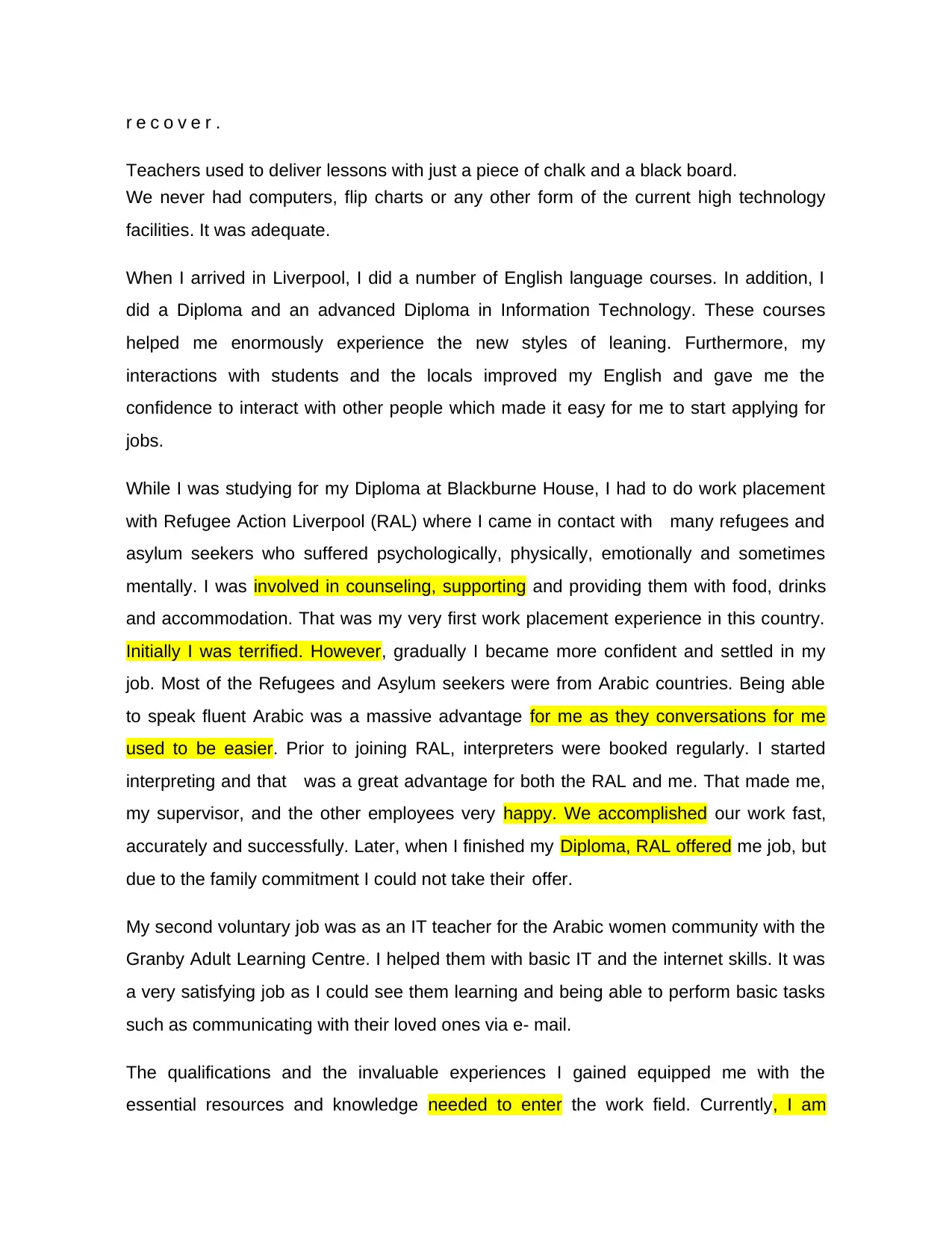
r e c o v e r .
Teachers used to deliver lessons with just a piece of chalk and a black board.
We never had computers, flip charts or any other form of the current high technology
facilities. It was adequate.
When I arrived in Liverpool, I did a number of English language courses. In addition, I
did a Diploma and an advanced Diploma in Information Technology. These courses
helped me enormously experience the new styles of leaning. Furthermore, my
interactions with students and the locals improved my English and gave me the
confidence to interact with other people which made it easy for me to start applying for
jobs.
While I was studying for my Diploma at Blackburne House, I had to do work placement
with Refugee Action Liverpool (RAL) where I came in contact with many refugees and
asylum seekers who suffered psychologically, physically, emotionally and sometimes
mentally. I was involved in counseling, supporting and providing them with food, drinks
and accommodation. That was my very first work placement experience in this country.
Initially I was terrified. However, gradually I became more confident and settled in my
job. Most of the Refugees and Asylum seekers were from Arabic countries. Being able
to speak fluent Arabic was a massive advantage for me as they conversations for me
used to be easier. Prior to joining RAL, interpreters were booked regularly. I started
interpreting and that was a great advantage for both the RAL and me. That made me,
my supervisor, and the other employees very happy. We accomplished our work fast,
accurately and successfully. Later, when I finished my Diploma, RAL offered me job, but
due to the family commitment I could not take their offer.
My second voluntary job was as an IT teacher for the Arabic women community with the
Granby Adult Learning Centre. I helped them with basic IT and the internet skills. It was
a very satisfying job as I could see them learning and being able to perform basic tasks
such as communicating with their loved ones via e- mail.
The qualifications and the invaluable experiences I gained equipped me with the
essential resources and knowledge needed to enter the work field. Currently, I am
Teachers used to deliver lessons with just a piece of chalk and a black board.
We never had computers, flip charts or any other form of the current high technology
facilities. It was adequate.
When I arrived in Liverpool, I did a number of English language courses. In addition, I
did a Diploma and an advanced Diploma in Information Technology. These courses
helped me enormously experience the new styles of leaning. Furthermore, my
interactions with students and the locals improved my English and gave me the
confidence to interact with other people which made it easy for me to start applying for
jobs.
While I was studying for my Diploma at Blackburne House, I had to do work placement
with Refugee Action Liverpool (RAL) where I came in contact with many refugees and
asylum seekers who suffered psychologically, physically, emotionally and sometimes
mentally. I was involved in counseling, supporting and providing them with food, drinks
and accommodation. That was my very first work placement experience in this country.
Initially I was terrified. However, gradually I became more confident and settled in my
job. Most of the Refugees and Asylum seekers were from Arabic countries. Being able
to speak fluent Arabic was a massive advantage for me as they conversations for me
used to be easier. Prior to joining RAL, interpreters were booked regularly. I started
interpreting and that was a great advantage for both the RAL and me. That made me,
my supervisor, and the other employees very happy. We accomplished our work fast,
accurately and successfully. Later, when I finished my Diploma, RAL offered me job, but
due to the family commitment I could not take their offer.
My second voluntary job was as an IT teacher for the Arabic women community with the
Granby Adult Learning Centre. I helped them with basic IT and the internet skills. It was
a very satisfying job as I could see them learning and being able to perform basic tasks
such as communicating with their loved ones via e- mail.
The qualifications and the invaluable experiences I gained equipped me with the
essential resources and knowledge needed to enter the work field. Currently, I am
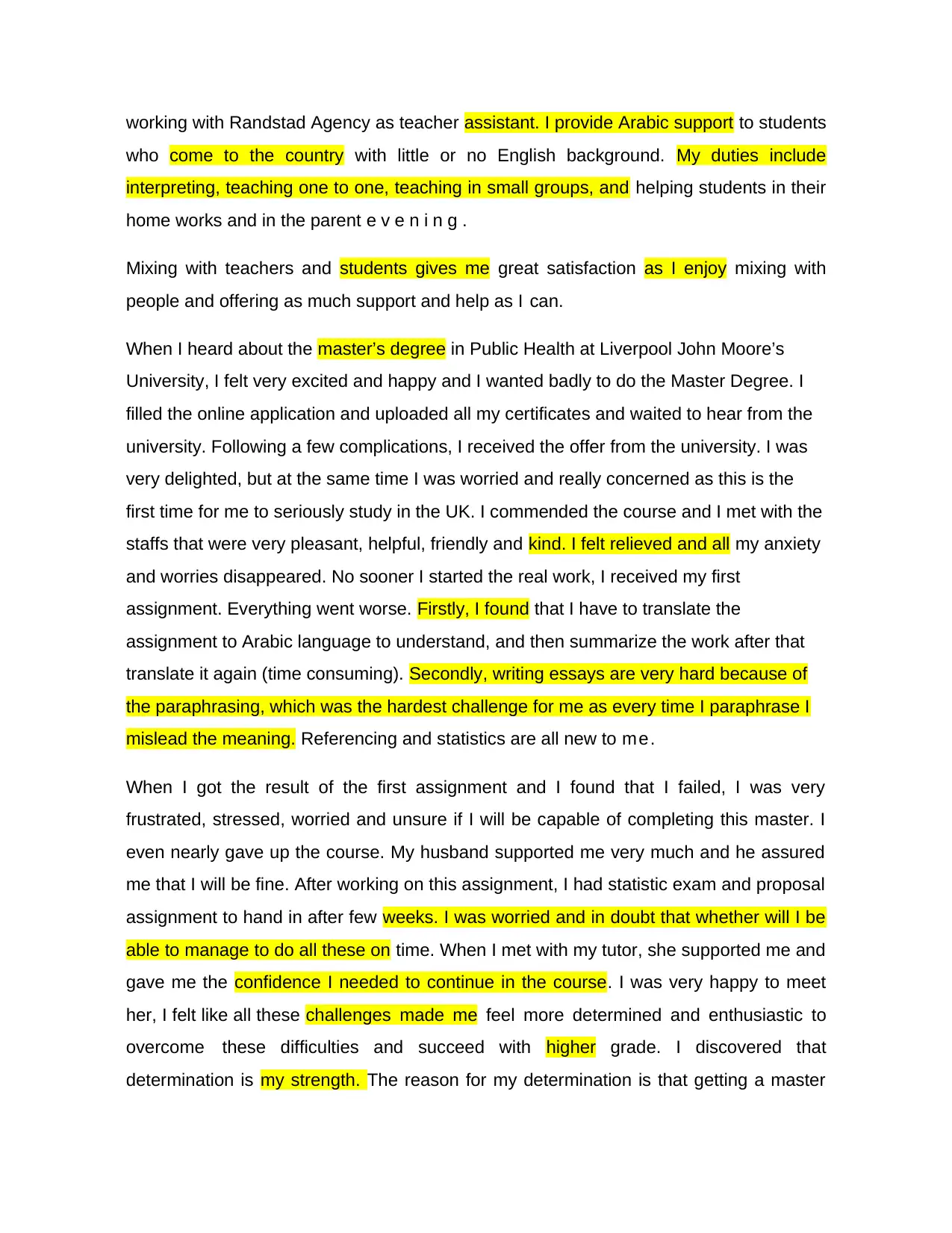
working with Randstad Agency as teacher assistant. I provide Arabic support to students
who come to the country with little or no English background. My duties include
interpreting, teaching one to one, teaching in small groups, and helping students in their
home works and in the parent e v e n i n g .
Mixing with teachers and students gives me great satisfaction as I enjoy mixing with
people and offering as much support and help as I can.
When I heard about the master’s degree in Public Health at Liverpool John Moore’s
University, I felt very excited and happy and I wanted badly to do the Master Degree. I
filled the online application and uploaded all my certificates and waited to hear from the
university. Following a few complications, I received the offer from the university. I was
very delighted, but at the same time I was worried and really concerned as this is the
first time for me to seriously study in the UK. I commended the course and I met with the
staffs that were very pleasant, helpful, friendly and kind. I felt relieved and all my anxiety
and worries disappeared. No sooner I started the real work, I received my first
assignment. Everything went worse. Firstly, I found that I have to translate the
assignment to Arabic language to understand, and then summarize the work after that
translate it again (time consuming). Secondly, writing essays are very hard because of
the paraphrasing, which was the hardest challenge for me as every time I paraphrase I
mislead the meaning. Referencing and statistics are all new to me.
When I got the result of the first assignment and I found that I failed, I was very
frustrated, stressed, worried and unsure if I will be capable of completing this master. I
even nearly gave up the course. My husband supported me very much and he assured
me that I will be fine. After working on this assignment, I had statistic exam and proposal
assignment to hand in after few weeks. I was worried and in doubt that whether will I be
able to manage to do all these on time. When I met with my tutor, she supported me and
gave me the confidence I needed to continue in the course. I was very happy to meet
her, I felt like all these challenges made me feel more determined and enthusiastic to
overcome these difficulties and succeed with higher grade. I discovered that
determination is my strength. The reason for my determination is that getting a master
who come to the country with little or no English background. My duties include
interpreting, teaching one to one, teaching in small groups, and helping students in their
home works and in the parent e v e n i n g .
Mixing with teachers and students gives me great satisfaction as I enjoy mixing with
people and offering as much support and help as I can.
When I heard about the master’s degree in Public Health at Liverpool John Moore’s
University, I felt very excited and happy and I wanted badly to do the Master Degree. I
filled the online application and uploaded all my certificates and waited to hear from the
university. Following a few complications, I received the offer from the university. I was
very delighted, but at the same time I was worried and really concerned as this is the
first time for me to seriously study in the UK. I commended the course and I met with the
staffs that were very pleasant, helpful, friendly and kind. I felt relieved and all my anxiety
and worries disappeared. No sooner I started the real work, I received my first
assignment. Everything went worse. Firstly, I found that I have to translate the
assignment to Arabic language to understand, and then summarize the work after that
translate it again (time consuming). Secondly, writing essays are very hard because of
the paraphrasing, which was the hardest challenge for me as every time I paraphrase I
mislead the meaning. Referencing and statistics are all new to me.
When I got the result of the first assignment and I found that I failed, I was very
frustrated, stressed, worried and unsure if I will be capable of completing this master. I
even nearly gave up the course. My husband supported me very much and he assured
me that I will be fine. After working on this assignment, I had statistic exam and proposal
assignment to hand in after few weeks. I was worried and in doubt that whether will I be
able to manage to do all these on time. When I met with my tutor, she supported me and
gave me the confidence I needed to continue in the course. I was very happy to meet
her, I felt like all these challenges made me feel more determined and enthusiastic to
overcome these difficulties and succeed with higher grade. I discovered that
determination is my strength. The reason for my determination is that getting a master
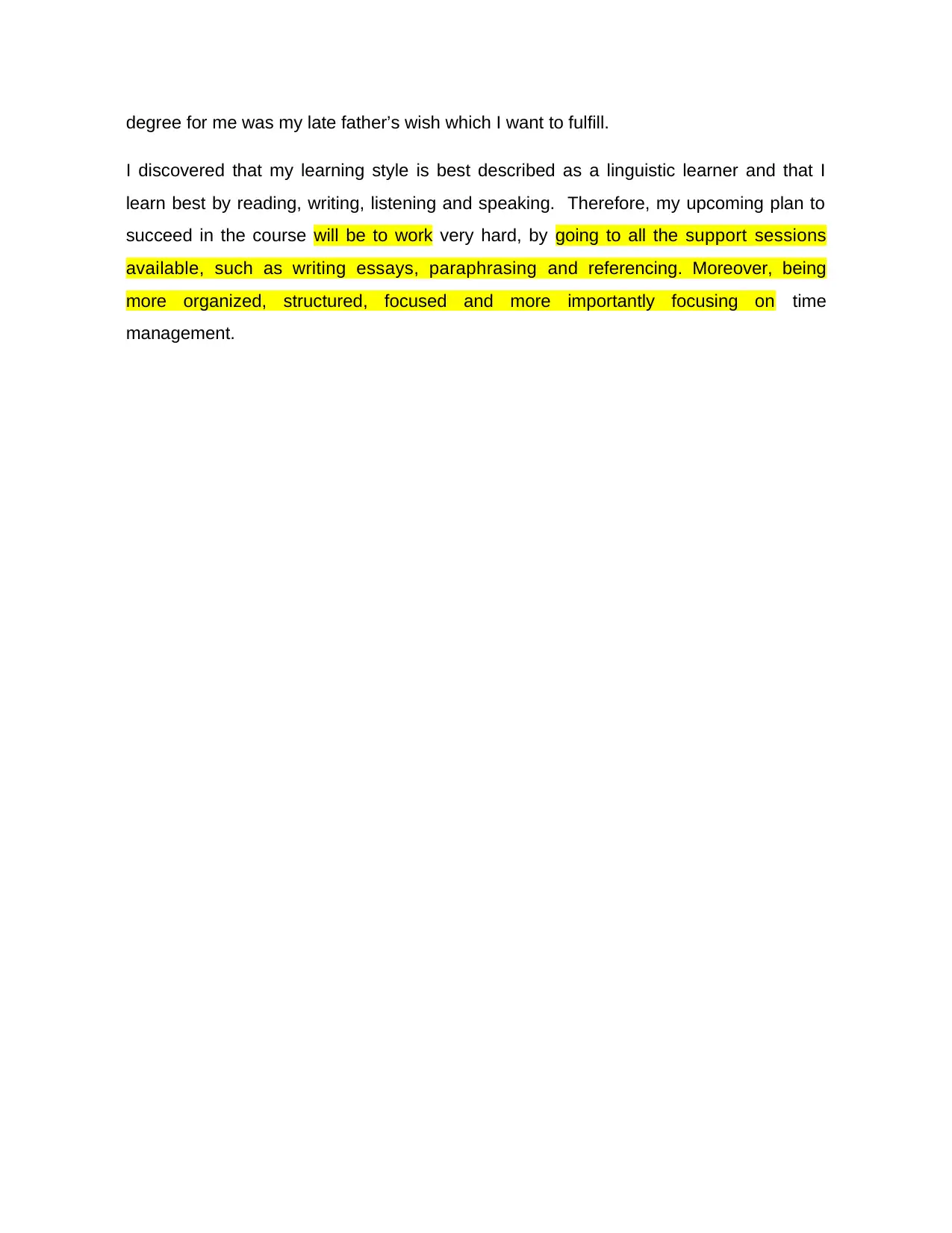
degree for me was my late father’s wish which I want to fulfill.
I discovered that my learning style is best described as a linguistic learner and that I
learn best by reading, writing, listening and speaking. Therefore, my upcoming plan to
succeed in the course will be to work very hard, by going to all the support sessions
available, such as writing essays, paraphrasing and referencing. Moreover, being
more organized, structured, focused and more importantly focusing on time
management.
I discovered that my learning style is best described as a linguistic learner and that I
learn best by reading, writing, listening and speaking. Therefore, my upcoming plan to
succeed in the course will be to work very hard, by going to all the support sessions
available, such as writing essays, paraphrasing and referencing. Moreover, being
more organized, structured, focused and more importantly focusing on time
management.
1 out of 7
Related Documents
Your All-in-One AI-Powered Toolkit for Academic Success.
+13062052269
info@desklib.com
Available 24*7 on WhatsApp / Email
![[object Object]](/_next/static/media/star-bottom.7253800d.svg)
Unlock your academic potential
© 2024 | Zucol Services PVT LTD | All rights reserved.




